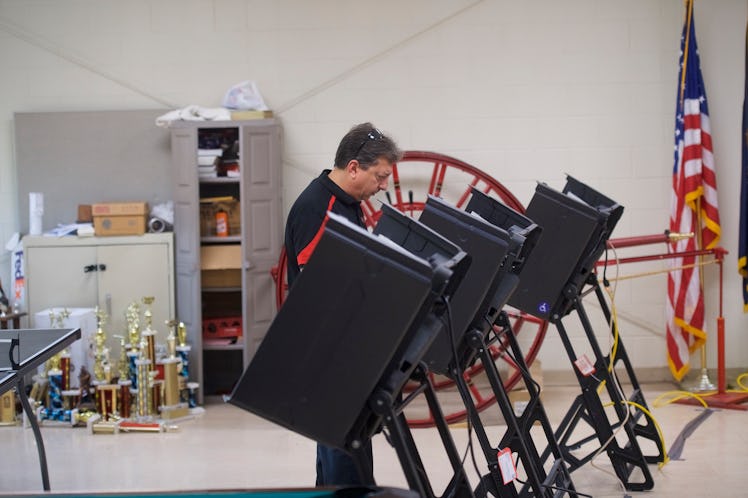
Experts Say The 2018 Midterms Can Get Hacked Easily & Here We Go Again
With the 2018 midterm elections approaching this fall (and primaries going on throughout the year — check your local elections), the question of whether or not the United States' voting systems are secure enough to ensure correct results is being widely debated. The Washington Post elected to interview a number of experts on whether or not they believe the upcoming elections can be hacked. According to a majority of those cybersecurity experts, the 2018 midterms are at risk of being hacked, which is just great.
The report published by the Post on May 21 featured quotes and statistics from a panel of over 100 cybersecurity experts from the government, academia, the private sector, and the research community. According to the report, 95 percent of the experts do not believe that state election systems are sufficiently protected from cyberthreats.
In an interview with NBC News on Feb. 8, head of cybersecurity at the Department of Homeland Security Jeanette Manfra revealed that Russian hackers reportedly targeted 21 states prior to the 2016 presidential election, and that "an exceptionally small number of them were actually successfully penetrated." Back in September 2017, the federal government notified election officials from those 21 states that their systems were targeted by Russian agents during the elections the year before.
In response to these reports, the spending bill that Congress passed on March 22 included a whopping $380 million devoted to ramping up cybersecurity in order to prevent state voting systems from any sort of cyberattack. But not everyone in Congress thinks that this is enough funding to prevent elections from getting compromised by foreign agents. “We are going to need more money and more guidance on how to effectively defend against the sophisticated adversaries we are facing to get our risk down to acceptable levels,” Rep. Jim Langevin (D-R.I.) told the Post. Langevin also co-chairs the Congressional Cybersecurity Caucus. If a person with as much authority on this issue as Langevin thinks more needs to be done to protect this country's elections, it's definitely something to take seriously.
The impact of the hacks from the 2016 presidential election has not yet been determined. But the fact that foreign agents were able to successfully hack some systems signals that the government should be working harder to ensure that elections in this country are fair and free.
Because the 2018 midterms are so important for both sides of the aisle, it's imperative that the outcomes of those elections are secure and correct. The problem with current voting systems is that they're not uniform across the entire country, making some polling counties more vulnerable than others. Those smaller counties could amount to a significant number of compromised votes, which in turn has enough weight to sway an election in one direction or another.
All 435 seats in the House of Representatives up for grabs come November, and 48 of those seats are considered to be competitive, according to The New York Times. In order for the Democrats to regain control of the House, they would need to flip at least 24 seats that are currently controlled by Republicans. The Senate is currently divided 51-49 in favor of Republicans, and Democrats might be able to pull off a Senate majority win following the midterms as well. Although it's not entirely likely that Democrats will regain control of both chambers of Congress, the tight races in each prove how crucial it is to ensure that state elections are appropriately protected.
The nation is just six months away from the midterm elections, and primaries have been going on. Hopefully, the appropriate authorities are doing what they can to protect your vote.